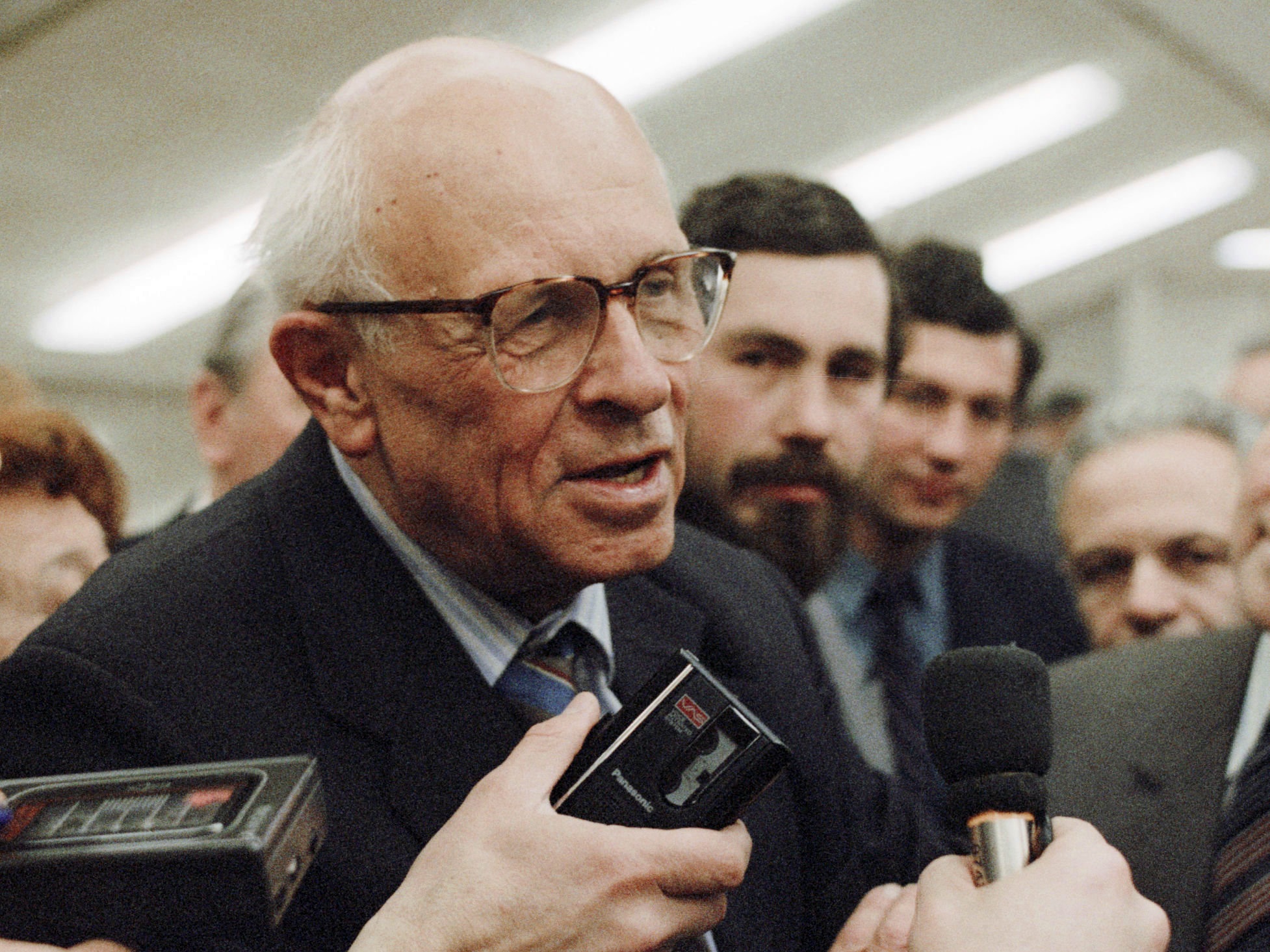Is Andrei Sakharov Not Worth a Plaque in Vilnius?

By Tomas Venclova and Robert van Voren, Vytautas Magnus University
In a few days, at the train station in Ekaterinburg, a plaque will be unveiled dedicated to the great Russian poet Osip Mandelshtam and his wife Nadezhda, who in 1934 were for a short time at the train station on their way to exile. A few years later Osip would pass the train station once again, this time alone, on the way to his ultimate death in the Gulag in 1938. The plaque, made by the sculptor Nikolai Predein, is the result of a meeting three years ago when a group of people were discussing the situation under Putin and one of them said “Well, if they would put up a plaque for Mandelshtam…”, thinking this would be impossible under Putin’s repressive regime. It appeared it was not impossible.
The fact that it appeared possible is not the only remarkable aspect of this story. In this case, the most remarkable aspect is the fact that Mandelshtam was at the train station only for a few hours, yet it was enough to earn him a plaque. In the fall of 2020, we asked the Vilnius municipality to put up a plaque on the building at 10 Tauro Street, commemorating the fact that Andrei Sakharov stayed there in December 1975, at the flat of a future member of the Lithuanian Helsinki Group, Eitan Finkelshtein. He was in town in order to attend the trial of his close friend Sergei Kovalyov, who had been arrested in Vilnius among others because of his support of Lithuanian dissidents, and was tried in Vilnius for “anti-Soviet agitation and propaganda”. He ultimately was sentenced to seven years in a labor camp and three years of exile, which he served in the remote region of Magadan.
Sakharov’s stay in Vilnius is important for one more reason. While Sakharov was staying at Tauro Street, his wife Yelena Bonner was in Oslo, receiving the Nobel Peace Prize on his behalf. He himself was not allowed to travel to Oslo, banned from international travel because of “holding state secrets”. Sakharov was at that time already the leading figure in the human rights movement in the USSR; but, above all, he was one of the most important nuclear physicists of the USSR and had at the age of 32 become the youngest member of the Academy of Sciences. He is known as the “father of the Hydrogen Bomb”, and since its development had become an outspoken opponent of nuclear proliferation and had made his voice heard to the Soviet leadership on many occasions. Initially this only irritated the Soviet leadership, to whom he had direct access because of his position, but gradually he was more and more ostracized and by 1973 a vicious press campaign had been unleashed against him, almost accusing him as a traitor of the motherland.
Vilnius municipality turned down our request because he stayed at Tauro Street for only a few days, and also because there is already a Sakharov Square in Vilnius. This square is a story in and of itself, because it is located in the outskirts of Vilnius, and it is not a square but the corner of an area that can best be described as windy and isolated, basically consisting of a solitary bench in the middle of nowhere with an inscription that has been severely affected by time. The city intends to refurbish it, but it is unclear how, and the attempts to involve the Sakharov family in its design have been unsuccessful. The year 2021 is the Andrei Sakharov Centennial, as he was born on May 21, 1921, and in many cities of the world his legacy will be celebrated. However, as we were told, Vilnius has probably no funds available to carry out the refurbishment this year.
Sakharov stood at the birth of the human rights movement in the USSR since its inception and remained steadfast and undeterred in spite of all the repressive measures. He spoke out in defense of many politically repressed people, including numerous Lithuanian political prisoners. In fact, in his Nobel Peace Prize acceptance speech, he referred to several of them by name. He also signed a memorandum by Lithuanian, Latvian and Estonian dissidents, in which they demanded the annulment of the secret protocols of the Molotov-Ribbentrop Pact and the withdrawal of occupational forces from the Baltic states. It is no exaggeration that Sakharov played an important role in the political developments in Europe that eventually led to the demise of the Soviet empire and, in 1990, created the opportunity for Lithuania to declare independence again. For his role, he spent almost seven years in internal exile, watched and harassed by KGB around the clock and psychologically tortured in vile sophisticated ways. However, his activities inspired other freedom fighters, including Lithuanians.
Lithuania should be grateful to Andrei Sakharov, and in fact it was. In 2003, President Adamkus honored Sakharov’s widow Elena Bonner with the 3rd Class Order of the Lithuanian Grand Duke Gediminas exactly for her and her husband’s contribution to Lithuanian independence and their defense of freedom of speech in Lithuania.
Considering the above, we cannot understand the logic that it would not be opportune for Vilnius to commemorate Sakharov’s stay by putting up a plaque on a building, which we are even willing to finance ourselves, as we have indicated. We would strongly urge the municipality to reconsider its decision. Vilnius should be proud to link the name of Sakharov to its city, and not to some “square” in the outskirts where hardly a person ever comes, but in the center so that tourists can visit the place and see this important part of Lithuania’s history and its struggle for freedom and independence.












